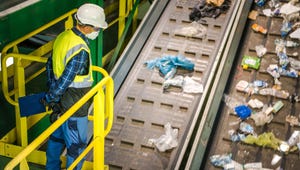When Dr Isao Noda retired from Proctor & Gamble after a long and distinguished career there, Meredian, the Georgia-based manufacturer of PHAs, moved quickly. The company had purchased the intellectual property that forms the basis of its bioplastic technology from Procter & Gamble in 2007 and was well aware of Noda's pioneering work in the field of a specific type of PHAs known as medium-chain-length polyhydroxylalkanoates. And subsequently snapped him up, naming him Director of Innovative Solutions in February of last year.
January 10, 2014
That explains why he was manning the Meredian stand at the European Bioplastics conference in Berlin in December last year, and his enthusiasm when talking about PHAs. Meredian produces its PHA via fermentation, using plant-based fatty acids derived from canola as feedstock. Interestingly, the bacteria used by Meredian in its fermentation production systems are not genetically modified, but occur naturally in the soil.
"It's a true case of invention driven innovation," Noda said. Serendipity had nothing to do with it. "I knew the pathway was there. I know a little bit about chemistry (Dr. Noda holds a Ph.D in chemical engineering from Columbia), and I knew it had to be there. The trick was finding it."
It took persistence, but it paid off in the end.
"I searched soil samples until I found the right bacteria. I collected them from all over. I asked all my students, when they went on vacation, to bring back soil samples. I told them: look for where the oil is, in crops or otherwise. That's where we'll find what we're looking for," Noda said. "And we did."
Since then, PHA development and Meredian have moved rapidly ahead. After spending 10 years on innovation and development, the company is now ready to go commercial. Its next steps include preparing its Bainbridge plant for full production in 2014, as well as continuing to educate consumers regarding this innovative 'disruptive' technology. As Paul Pereira, Meredian's executive chairman of the board, said during his presentation at the European Bioplastics conference: "We're bringing a new page to the bioplastics industry. We have various grades we can offer to customers, which are produced using different bacteria. Our PHA has polyolefin-like thermo-mechanical properties very close to PE and, at the same time, polyester-like physico-chemical properties."
According to Pereira, his company's medium-chain-length PHAs offer advantages in terms of thermal and mechanical properties. "We've introduced side chains, which are easily modulated," he said.
Chain branching reduces crystallinity and brings down the melting point, improving the processability of the material. "Because of the low crystallinity, it is ductile instead of rigid," he said. Meredian's PHAs can be converted on conventional equipment.
Pereira emphasized that his company's PHA presents impeccable environmental credentials. The company invested in vertical integration and now grows the non-GMO canola it uses for the production of its materials. The oil from the canola seeds is consumed by the bacteria, who convert the carbon into PHA as a reserve energy source. The PHA is then harvested, purified and readied for extrusion. A proprietary reactive extrusion process is then used to compound the material to customers' specifications. At the end of life, PHA converts to organic matter, which replenishes the carbon cycle for canola.
Why canola instead of a cheaper feedstock? Economics, according to Pereira. Using oil is better than using carbohydrates.
"With our process, instead of mining the planet without replenishing it, we tap into the natural carbon cycle, use it, and then it goes back into the cycle. PHAs degrade rapidly under aerobic and anaerobic conditions," Pereira said. "We've taken the time to put a platform in place and can offer our PHA at highly competitive prices. Our focus is on low cost manufacturing for a high quality product. One of the main factors is our proprietary filtration process that dramatically reduces the cost, as no solvents are used, plus the lower cycle time. We have a higher yield per pound of feedstock. And we'll continue to improve on pricing," he promised.
"We hope to become the biggest in the world."
About the Author(s)
You May Also Like


